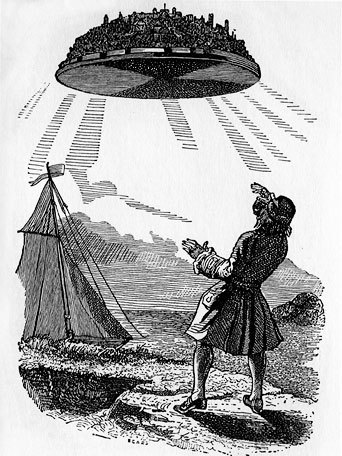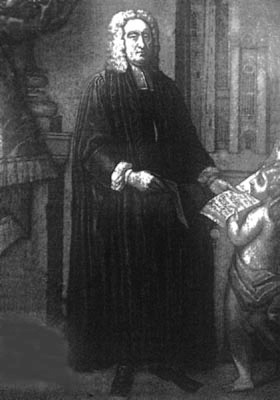|
The Engine
The Engine is a fictional device described in the 1726 satirical novel ''Gulliver's Travels'' by Jonathan Swift. It is possibly the earliest known reference to a device in any way resembling a modern computer. The Engine is a device that generates permutations of word sets. It is found at the Academy of Projectors in Lagado and is described thus by Swift: “... Every one knew how laborious the usual method is of attaining to arts and sciences; whereas, by his contrivance, the most ignorant person, at a reasonable charge, and with a little bodily labour, might write books in philosophy, poetry, politics, laws, mathematics, and theology, without the least assistance from genius or study.” He then led me to the frame, about the sides, whereof all his pupils stood in ranks. It was twenty feet square, placed in the middle of the room. The superfices was composed of several bits of wood, about the bigness of a die, but some larger than others. They were all linked together by slende ... [...More Info...] [...Related Items...] OR: [Wikipedia] [Google] [Baidu] |
Gulliver's Travels
''Gulliver's Travels'', originally titled ''Travels into Several Remote Nations of the World. In Four Parts. By Lemuel Gulliver, First a Surgeon, and then a Captain of Several Ships'', is a 1726 prose satire by the Anglo-Irish writer and clergyman Jonathan Swift, satirising human nature and the imaginary "Imaginary voyage, travellers' tales" literary subgenre. It is Swift's best-known full-length work, one of the most famous classics of English literature, and popularised the fictional island of Lilliput and Blefuscu, Lilliput. The English poet and dramatist John Gay remarked, "It is universally read, from the cabinet council to the nursery." The book has been adapted for over a dozen films, movies, plays, and theatrical performances over the centuries. The book was an immediate success, and Swift claimed that he wrote ''Gulliver's Travels'' "to vex the world rather than divert it". Plot Part I: A Voyage to Lilliput The travel begins with a short preamble in which Lemuel Gu ... [...More Info...] [...Related Items...] OR: [Wikipedia] [Google] [Baidu] |
Jonathan Swift
Jonathan Swift (30 November 1667 – 19 October 1745) was an Anglo-Irish writer, essayist, satirist, and Anglican cleric. In 1713, he became the Dean (Christianity), dean of St Patrick's Cathedral, Dublin, and was given the sobriquet "Dean Swift". His trademark deadpan and ironic style of writing, particularly in works such as ''A Modest Proposal'' (1729), has led to such satire being subsequently termed as "Swiftian". He wrote the satirical book ''Gulliver's Travels'' (1726), which became his best-known publication and popularised the fictional island of Lilliput and Blefuscu, Lilliput. Following the remarkable success of his works, Swift came to be regarded by many as the greatest satirist of the Georgian era, and one of the foremost prose satirists in the history of English literature. Swift also authored works such as ''A Tale of a Tub'' (1704) and ''An Argument Against Abolishing Christianity'' (1712). He originally published all of his works under pseudonyms—including L ... [...More Info...] [...Related Items...] OR: [Wikipedia] [Google] [Baidu] |
IEEE
The Institute of Electrical and Electronics Engineers (IEEE) is an American 501(c)(3) organization, 501(c)(3) public charity professional organization for electrical engineering, electronics engineering, and other related disciplines. The IEEE has a corporate office in New York City and an operations center in Piscataway, New Jersey. The IEEE was formed in 1963 as an amalgamation of the American Institute of Electrical Engineers and the Institute of Radio Engineers. History The IEEE traces its founding to 1884 and the American Institute of Electrical Engineers. In 1912, the rival Institute of Radio Engineers was formed. Although the AIEE was initially larger, the IRE attracted more students and was larger by the mid-1950s. The AIEE and IRE merged in 1963. The IEEE is headquartered in New York City, but most business is done at the IEEE Operations Center in Piscataway, New Jersey, opened in 1975. The Australian Section of the IEEE existed between 1972 and 1985, after which it s ... [...More Info...] [...Related Items...] OR: [Wikipedia] [Google] [Baidu] |
Permutations
In mathematics, a permutation of a Set (mathematics), set can mean one of two different things: * an arrangement of its members in a sequence or linear order, or * the act or process of changing the linear order of an ordered set. An example of the first meaning is the six permutations (orderings) of the set : written as tuples, they are (1, 2, 3), (1, 3, 2), (2, 1, 3), (2, 3, 1), (3, 1, 2), and (3, 2, 1). Anagrams of a word whose letters are all different are also permutations: the letters are already ordered in the original word, and the anagram reorders them. The study of permutations of finite sets is an important topic in combinatorics and group theory. Permutations are used in almost every branch of mathematics and in many other fields of science. In computer science, they are used for analyzing sorting algorithms; in quantum physics, for describing states of particles; and in biology, for describing RNA sequences. The number of permutations of distinct objects is &nbs ... [...More Info...] [...Related Items...] OR: [Wikipedia] [Google] [Baidu] |
Academy Of Projectors
Lagado is a fictional city from the 1726 satirical novel ''Gulliver's Travels'' by Jonathan Swift. Location Lagado is the capital of the nation Balnibarbi, which is ruled by a tyrannical king from a flying island called Laputa. Lagado is on the ground below Laputa, and also has access to Laputa at any given time to proceed in an attack or defense. It is located in the centre of the kingdom, some 150 miles from that land's Pacific coast. Description Lagado is poverty stricken like the rest of the nation. The king had invested a great fortune on building an Academy of Projectors in Lagado so that it shall contribute to the nation's development through research, but so far the Academy has yielded no result. The author has vividly described bizarre and seemingly pointless experiments conducted there, for example - trying to change human excretion back into food and trying to extract sunbeams out of cucumbers or teaching mathematics to pupils by writing propositions on wafers and con ... [...More Info...] [...Related Items...] OR: [Wikipedia] [Google] [Baidu] |
Ramon Llull
Ramon Llull (; ; – 1316), sometimes anglicized as ''Raymond Lully'', was a philosopher, theologian, poet, missionary, Christian apologist and former knight from the Kingdom of Majorca. He invented a philosophical system known as the ''Art'', conceived as a type of universal logic to prove the truth of Christian doctrine to interlocutors of all faiths and nationalities. The ''Art'' consists of a set of general principles and combinatorial operations. It is illustrated with diagrams. A prolific writer, he is also known for his literary works written in Catalan, which he composed to make his ''Art'' accessible to a wider audience. In addition to Catalan and Latin, he also probably wrote in Arabic (although no texts in Arabic survive). His books were translated into Occitan, French, and Castilian during his lifetime. Although his work did not enjoy huge success during his lifetime, he has had a rich and continuing reception. In the early modern period his name became asso ... [...More Info...] [...Related Items...] OR: [Wikipedia] [Google] [Baidu] |
Fictional Computers
Fiction is any creative work, chiefly any narrative work, portraying individuals, events, or places that are imaginary or in ways that are imaginary. Fictional portrayals are thus inconsistent with fact, history, or plausibility. In a traditional narrow sense, fiction refers to written narratives in prose often specifically novels, novellas, and short stories. More broadly, however, fiction encompasses imaginary narratives expressed in any medium, including not just writings but also live theatrical performances, films, television programs, radio dramas, comics, role-playing games, and video games. Definition and theory Typically, the fictionality of a work is publicly expressed, so the audience expects a work of fiction to deviate to a greater or lesser degree from the real world, rather than presenting for instance only factually accurate portrayals or characters who are actual people. Because fiction is generally understood as not adhering to the real world, the them ... [...More Info...] [...Related Items...] OR: [Wikipedia] [Google] [Baidu] |
Criticism Of Science
Criticism of science addresses problems within science in order to improve science as a whole and its role in society. Criticisms come from philosophy, from social movements like feminism, and from within science itself. The emerging field of metascience seeks to increase the quality of and efficiency of scientific research by improving the scientific process. Philosophical critiques Philosopher of science Paul Feyerabend advanced the idea of epistemological anarchism, which holds that there are no useful and exception-free methodological rules governing the progress of science or the growth of knowledge, and that the idea that science can or should operate according to universal and fixed rules is unrealistic, pernicious and detrimental to science itself. Feyerabend advocates a democratic society where science is treated as equal to other ideologies or social institutions such as religion, and education, or magic and mythology, and considers the dominance of science in ... [...More Info...] [...Related Items...] OR: [Wikipedia] [Google] [Baidu] |
Automated Reasoning
In computer science, in particular in knowledge representation and reasoning and metalogic, the area of automated reasoning is dedicated to understanding different aspects of reasoning. The study of automated reasoning helps produce computer programs that allow computers to reason completely, or nearly completely, automatically. Although automated reasoning is considered a sub-field of artificial intelligence, it also has connections with theoretical computer science and philosophy. The most developed subareas of automated reasoning are automated theorem proving (and the less automated but more pragmatic subfield of interactive theorem proving) and automated proof checking (viewed as guaranteed correct reasoning under fixed assumptions). Extensive work has also been done in reasoning by analogy using induction and abduction. Other important topics include reasoning under uncertainty and non-monotonic reasoning. An important part of the uncertainty field is that of argumentat ... [...More Info...] [...Related Items...] OR: [Wikipedia] [Google] [Baidu] |



